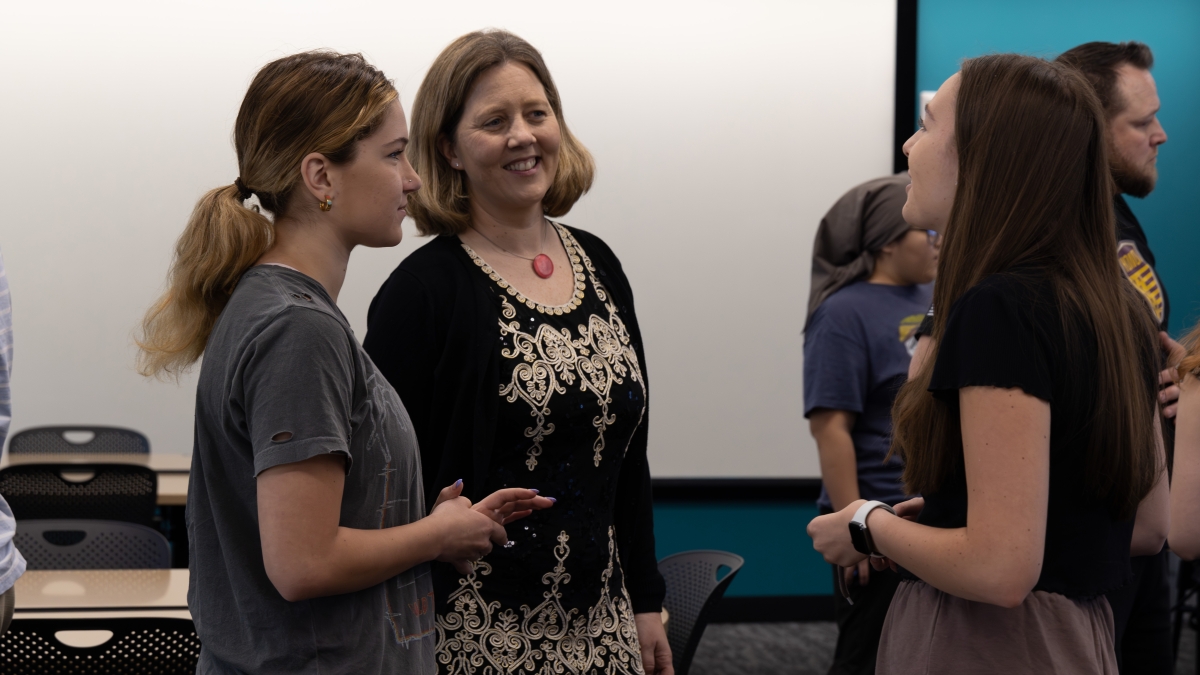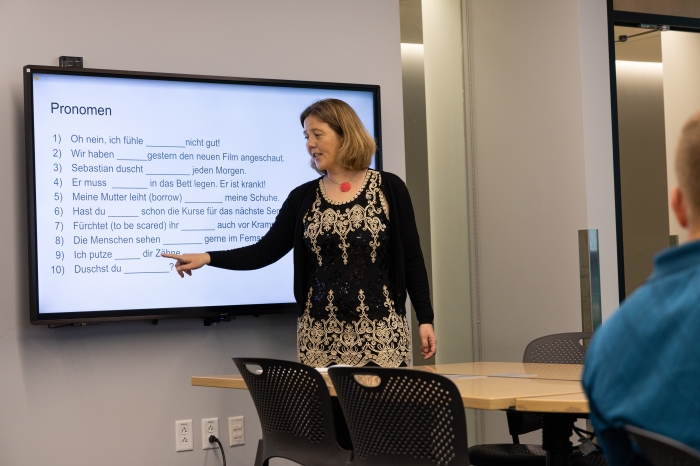ASU professor named 2024 Teacher of the Year by Southwest Conference on Language Teaching

ASU's Sara Lee (second from left) has been recognized by the Southwest Conference on Language Teaching as the 2024 Teacher of the Year. Photo by Meghan Finnerty
This year, the Southwest Conference on Language Teaching (SWCOLT) has recognized Arizona State University’s Sara Lee as the 2024 Teacher of the Year.
As part of the selection process, Lee gave a policy speech on the importance of language learning, her aspirations of moving the field forward, and the improvements she hopes to make.
“My research area is language learning and disabilities — so how can you learn a second language when you have a learning disability, especially dyslexia, but also other learning disabilities. And so that was a lot of my policy speech, and I’m so passionate about this topic," said Lee, an associate teaching professor of German at ASU's School of International Letters and Cultures.
"I really, really want to find ways to make second language learning more accessible and teach teachers how to help their learners in the second language classroom.”
Lee will represent the SWCOLT at the American Council on the Teaching of Foreign Languages in November as a contender for the National Teacher of the Year award.
Lee said she was surprised to be selected as the SWCOLT Teacher of the Year, since eight deserving state candidates were also in the running.
“Talking to them and seeing how accomplished they were, I was really just proud to be a part of that group and be considered,” she said. “In that moment when they did announce it, there was just a lot of disbelief.”
A German native, Lee received her first master’s degree in teaching in Germany before getting her second master's degree in German and second language acquisition in the U.S. Her mother was working at a dyslexia institute in Germany and suggested Lee do her master’s thesis on the learning disorder. Following the completion of her thesis, Lee was offered a job at the institute and worked as a dyslexia therapist in Germany, which she loved.
“You have students there who are clearly very smart, and they're trying everything, but in this one area, they just cannot move forward," she said. "And so, being able, not just linguistically ... help them work with their dyslexia and better their spelling and their reading, but actually to make them confident learners again. So the whole social-emotional side of being a therapist, that meant the most to me."
Lee used her experience as a dyslexia therapist in Germany for native speakers coupled with her experience as a second language teacher of German to create a program central to her doctoral research, called “to increase phonological awareness in lexical storage in learning German in the second language classroom.” This program involves developing an error analysis for dyslexic learners of German. She collects data in her classroom to see how effective her philosophy is in helping her students — first conducting an initial assessment, then an innovation project throughout the semester, and finally a post-intervention assessment.
“It is so fascinating to see the improvement of my students. And so it’s all very interconnected — what I do as a teacher and for my doctorate and then also my service and outreach,” she said.
Throughout the class, Lee works to find as many ways as possible to individually challenge her students and encourage them to increase their proficiency. She does this for all students, but especially neurodiverse learners.
“My philosophy in teaching is that we have to understand that every learner has their unique set of skills. And this is not just for the disabled learner, but this is really for any learner who has their own strength, and their own areas of where they need help," Lee said. "And I think that our goal as teachers should always be to get to know our learners, and that we have a toolbox of ideas of how we can increase each learner's proficiency. So that's why I'm a big fan of addressing the heterogeneity in the classroom."
Lee believes teachers should have the knowledge to be able to effectively teach students who have dyslexia, but it is not always a part of a teacher’s education. She said there needs to be more research done in the area of second language acquisition and dyslexia. According to Lee, if teachers are informed about the small changes they can make in the classroom that are beneficial to students with learning disabilities, that can make a huge difference. She said there are no-cost strategies and no-cost methods teachers can implement in their curriculum to create a more inclusive learning environment.
“That’s why it’s especially important to offer workshops and conference presentations to help teachers, because the teachers love their students. They want to know how to really help them and how to support every student,” Lee said.
More Arts, humanities and education

School of Social Work’s ‘keepin’ it REAL’ substance use prevention program to expand across Sonora this spring
More than 7,000 seventh graders in the Mexican state of Sonora will enroll this spring in an Arizona State University program that has been teaching how to prevent substance use to thousands of…

An intergenerational approach to learning
Five students stood in front of the class and went through their presentation, complete with video and, afterward, a Q&A session.At first glance, it was similar to the hundreds of presentations…

ASU research finds high dissatisfaction among Arizona's K–12 educators
New research at Arizona State University has found deep dissatisfaction among Arizona's K–12 educators, who cite overwhelming workload and low pay as top frustrations.Researchers at the Morrison…
